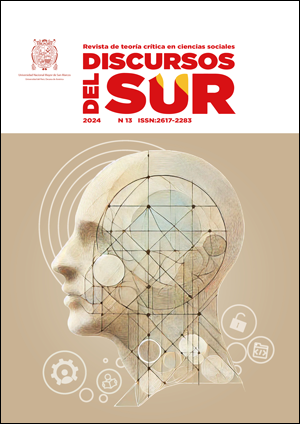Resistance to the motherhood mandate: Discourses on non-motherhood among women aged 25 to 45 from middle and upper strata in Metropolitan Lima who have chosen not to have children
DOI:
https://doi.org/10.15381/dds.n13.27351Keywords:
non-motherhood, social pressure, stigma, moral violence, genderAbstract
This article examines the complex dynamics of non-motherhood in contemporary Peruvian society, focusing on middle and upper-class women in Metropolitan Lima. By employing a qualitative methodology centered on narratives, the study explores the meanings attributed to motherhood and non-motherhood, challenging concepts such as "maternal instinct." Autonomy emerges as a right and diverse reasons for choosing not to become a mother are revealed. Moreover, the study addresses stigma, social pressure, and moral violence, highlighting strategies of resistance against the maternal mandate and the construction of new female identities. The article advocates for inclusive dialogue regarding the life choices of these women.
References
Ames, P. (2013). ¿Construyendo nuevas identidades? Género y educación en los proyectos de vida de las jóvenes rurales de Perú. Documento de trabajo del programa Nuevas Trenzas, serie 16. Instituto de Estudios Peruanos, Nuevas Trenzas.
Badinter, E. (1981). ¿Existe el amor maternal? Historia del amor maternal. Siglos XVII al XX. Paidós.
Baraldo, L. (2003). Experiências de Mulheres sem Filhos: a Mulher Singular no Plural. Psicologia Ciência e Profissão, 23(4), 2-11. https://doi.org/10.1590/S1414-98932003000400002
Bórquez, C. (2013). No quiero ser mamá. Análisis del relato de mujeres que decidieron no ser madres [tesis de licenciatura]. Universidad de Chile.
Caruncho, C. y Mayobre, P. (1998). El problema de la identidad femenina y los nuevos mitos. En Novos Dereitos: Igualdade, Diversidade e Disidencia (pp. 155-172). Tórculo
De Beauvoir, S. (1949). El segundo sexo. Éditions Gallimard
Escobar, V. (2018). Mujeres profesionales en ruptura con la maternidad: la decisión de no tener hijos y sus implicancias en las esferas de lo laboral y la salud sexual-reproductiva – Chile, 2017 [tesis de maestría]. Universidad de Concepción.
Fuller, N. (2001). Maternidad e identidad femenina: relato de sus desencuentros. En S. Donas (Comp.). Adolescencia y juventud en América Latina (pp. 225-242). Libro Universitario Regional (EULAC-GTZ).
Hakim, C. (2003). Childlessness in Europe. ESRC Full Research Report.
Naciones Unidas (2014). World Fertility Report 2013: Fertility at the Extremes. https://n9.cl/ss856
Naciones Unidas (2014). La situación demográfica en el mundo. https://n9.cl/dhrio
Instituto Nacional de Estadística e Informática (INEI) (2024). Perú: Encuesta Demográfica y de Salud Familiar 2023 [ENDES]. https://n9.cl/304xno
Ipsos Apoyo (2021). Perfiles socioeconómicos de Lima Metropolitana 2020. https://n9.cl/jke8r
Mandujano, Y. (2021). Ser childfree en México: narrativas personales de quienes no desean ser madres o padres y su negociación con los estigmas sociales. Universidad Autónoma de Ciudad Juárez.
Medrano, T. (2021). Factores que influyen en la disminución de la tasa de natalidad en mujeres de 20 a 40 años en el distrito de Chiclayo [tesis de licenciatura]. Universidad Católica Santo Toribio de Mogrovejo.
Molina, S. (2014). El mito del instinto maternal y su relación con el control social de las mujeres. Universidad de la República de Uruguay.
Muñoz, C. (2016). ¿Mujer= madre? Razones de un grupo de mujeres para no tener hijos o hijas [tesis de maestría]. Universidad Nacional de Colombia, Colombia
Park, K. (2002). Stigma management among the voluntarily childless. Westminster College.
Ramírez, V. (2013). Una aproximación sociocultural a la no maternidad voluntaria [tesis de maestría]. Universidad Jesuita de Guadalajara.
Rodríguez, B. (2020). Mujeres, envejecimiento y no maternidad: construcción de significados en torno a la vejez y la feminidad desde las biografías de mujeres mayores sin hijos/as. Universidad de Chile.
Segato, R. (2003). Las estructuras elementales de la violencia. Universidad Nacional de Quilmes
Stern, F. (2005). El estigma y la discriminación. Ciudadanos estigmatizados, sociedades lujuriosas. Noveduc.
Zicavo, E. (2013). Mujeres que optan por no tener hijos: un abordaje cultural. Universidad de Buenos Aires.
Downloads
Published
Issue
Section
License
Copyright (c) 2024 Karol Josefina Altamirano Camacho

This work is licensed under a Creative Commons Attribution 4.0 International License.
THE AUTHORS RETAIN THEIR RIGHTS:
(a) The authors retain their trademark and patent rights, and also on any process or procedure described in the article.
(b) The authors retain the right to share, copy, distribute, execute and publicly communicate the article published in Discursos Del Sur (in example, depositing the article in an institutional repository or publish it in a book), with recognition of its initial publication in the Discursos Del Sur.
(c) The authors retain the right to make a later publication of their work, to use the article or any part of it (for example: a compilation of their works, notes for conferences, thesis, or for a book), provided that they indicate the source of publication (authors of the work, magazine, volume, number and date).






